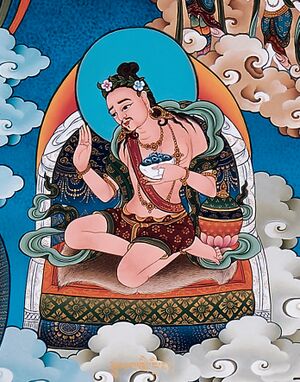No edit summary |
No edit summary |
||
| Line 3: | Line 3: | ||
|blogDate=November 2021, Week 1 | |blogDate=November 2021, Week 1 | ||
|blogTitle=Maitrīpa's True Reality | |blogTitle=Maitrīpa's True Reality | ||
|blogImage=File:Maitripa (8 chariots).jpg | |||
|blogCaption=Maitrīpa | |||
|blogContent=[[People/Maitrīpa|Maitrīpa]], according to a common account of the [[Texts/Ratnagotravibhāga_Mahāyānottaratantraśāstra|''Ultimate Continuum'']] passed down through Tibetan lineages, is said to have rediscovered the text of the [[Texts/Ratnagotravibhāga_Mahāyānottaratantraśāstra|''Ultimate Continuum'']] and [[Texts/Dharmadharmatāvibhāga|''Distinguishing Phenomena and Their Nature'']]. He in fact cites the [[Texts/Ratnagotravibhāga_Mahāyānottaratantraśāstra|''Ultimate Continuum'']] in his work. Yet, it is curious that [[People/Maitrīpa|Maitrīpa]] does not use the terms ''tathāgatagarbha'', ''sugatagarbha'', or ''dhatu'' in his writings to refer to buddha-nature. He does, however, discuss the luminous and empty nature of the mind both in the contexts of sūtra and tantra traditions. | |blogContent=[[People/Maitrīpa|Maitrīpa]], according to a common account of the [[Texts/Ratnagotravibhāga_Mahāyānottaratantraśāstra|''Ultimate Continuum'']] passed down through Tibetan lineages, is said to have rediscovered the text of the [[Texts/Ratnagotravibhāga_Mahāyānottaratantraśāstra|''Ultimate Continuum'']] and [[Texts/Dharmadharmatāvibhāga|''Distinguishing Phenomena and Their Nature'']]. He in fact cites the [[Texts/Ratnagotravibhāga_Mahāyānottaratantraśāstra|''Ultimate Continuum'']] in his work. Yet, it is curious that [[People/Maitrīpa|Maitrīpa]] does not use the terms ''tathāgatagarbha'', ''sugatagarbha'', or ''dhatu'' in his writings to refer to buddha-nature. He does, however, discuss the luminous and empty nature of the mind both in the contexts of sūtra and tantra traditions. | ||
He uses the term ''luminosity'' (འོད་གསལ་) in many of his writings, and it is this innate nature of the mind, which is empty, nondual, open, and luminous, that is the focus of his ''amanasikāra'' system. In his presentation of true reality in [[Texts/Tattvadaśaka|''Ten Verses on True Reality'']], which succinctly captures his philosophical and experiential stance on reality, [[People/Maitrīpa|Maitrīpa]] points out how all phenomena are of single taste (རོ་གཅིག་) and without a point of fixation (གནས་མེད་པ་), that the entire world is free from the duality of knowledge and knowables, and that even the assumption of nonduality is itself empty and luminous. Such reality is to be realized through the instructions of a guru, and having realized such "suchness," a yogin moves in the world with eyes wide open, with no fear, like a lion, in any manner he or she chooses, and is beyond worldly concerns, often taking up what looks like crazy behaviors. | He uses the term ''luminosity'' (འོད་གསལ་) in many of his writings, and it is this innate nature of the mind, which is empty, nondual, open, and luminous, that is the focus of his ''amanasikāra'' system. In his presentation of true reality in [[Texts/Tattvadaśaka|''Ten Verses on True Reality'']], which succinctly captures his philosophical and experiential stance on reality, [[People/Maitrīpa|Maitrīpa]] points out how all phenomena are of single taste (རོ་གཅིག་) and without a point of fixation (གནས་མེད་པ་), that the entire world is free from the duality of knowledge and knowables, and that even the assumption of nonduality is itself empty and luminous. Such reality is to be realized through the instructions of a guru, and having realized such "suchness," a yogin moves in the world with eyes wide open, with no fear, like a lion, in any manner he or she chooses, and is beyond worldly concerns, often taking up what looks like crazy behaviors. | ||
}} | }} | ||
Revision as of 12:32, 12 January 2022
Maitrīpa's True Reality
Maitrīpa, according to a common account of the Ultimate Continuum passed down through Tibetan lineages, is said to have rediscovered the text of the Ultimate Continuum and Distinguishing Phenomena and Their Nature. He in fact cites the Ultimate Continuum in his work. Yet, it is curious that Maitrīpa does not use the terms tathāgatagarbha, sugatagarbha, or dhatu in his writings to refer to buddha-nature. He does, however, discuss the luminous and empty nature of the mind both in the contexts of sūtra and tantra traditions.
He uses the term luminosity (འོད་གསལ་) in many of his writings, and it is this innate nature of the mind, which is empty, nondual, open, and luminous, that is the focus of his amanasikāra system. In his presentation of true reality in Ten Verses on True Reality, which succinctly captures his philosophical and experiential stance on reality, Maitrīpa points out how all phenomena are of single taste (རོ་གཅིག་) and without a point of fixation (གནས་མེད་པ་), that the entire world is free from the duality of knowledge and knowables, and that even the assumption of nonduality is itself empty and luminous. Such reality is to be realized through the instructions of a guru, and having realized such "suchness," a yogin moves in the world with eyes wide open, with no fear, like a lion, in any manner he or she chooses, and is beyond worldly concerns, often taking up what looks like crazy behaviors.
Weekly quote
~

